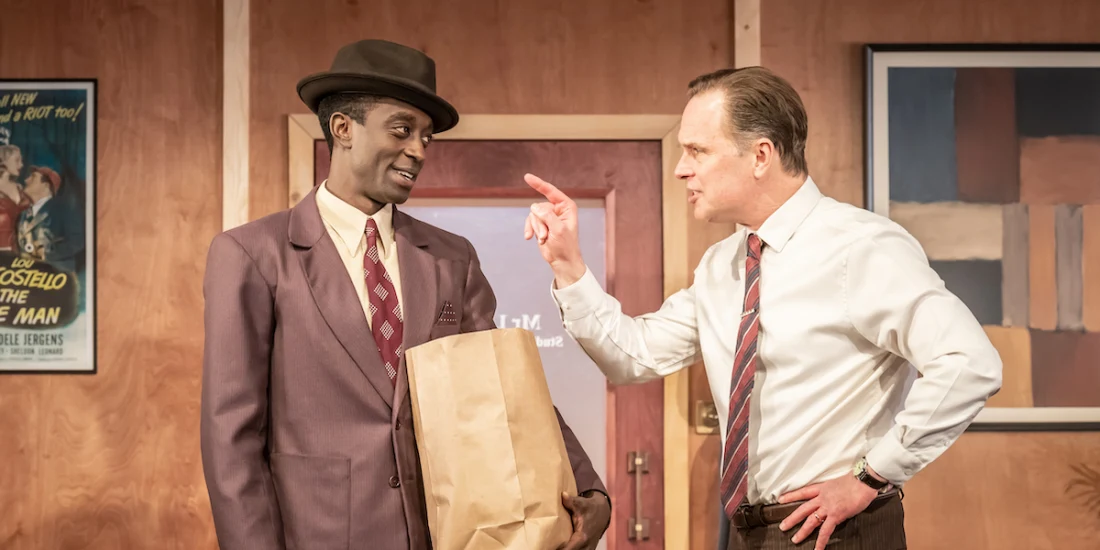'Retrograde' review – Ivanno Jeremiah is riveting as a conflicted Sidney Poitier
Read our four-star review of Ryan Calais Cameron's Retrograde, a play about Hollywood actor Sidney Poitier, currently running at the Kiln Theatre through 27 May.
Ryan Calais Cameron, whose extraordinary play For Blacks Boys Who Have Considered Suicide When the Hue Gets Too Heavy has become a rare new-writing West End hit, now returns with a new work at the Kiln Theatre. Retrograde dramatises a fascinating, little-known piece of history concerning the trailblazing African-American actor Sidney Poitier.
In this 90-minute, real-time piece set in the 1950s, Sidney is on the verge of his big break. He’d won praise for his role as a student in movie Blackboard Jungle, but since then the only parts he’s been offered are servants or thugs. Now he has the opportunity to star in a big network TV movie, playing a proper meaty role — but there’s a terrible catch.
Sidney thinks he’s just come into the office of NBC lawyer Mr. Parks to sign his contract. Instead, he’s questioned about his affiliation with campaigning figures like Martin Luther King and Harry Belafonte (who, coincidentally, passed away this week). There’s a dawning horror for Sidney as he realises he’s been spied on, or that the FBI have an informant close to him.
Parks demands that he sign a loyalty oath and publicly denounce the popular Black entertainer Paul Robeson, whose political activism has put him in the crosshairs of Senator McCarthy and his Red Scare witch hunt. If Sidney refuses, he will be blacklisted. Or, as the hideous Parks has it, he’ll be “Black-blacklisted” — condemned twice, for his race and his supposed communist sympathies. No matter the hypocrisy that his constitutional rights are being violated in the name of beating the anti-democratic Soviet Union.
Cameron powerfully conveys how much this weighs on Sidney. On the one hand, there’s his long struggle to succeed in the industry, and to support his family (he has two children and another on the way); on the other, Robeson has inspired him and countless others, so it would be a monstrous betrayal to his community. Could he live with himself if he sold out?
The third player in this fraught game is the squirrelly screenwriter Bobby. He too is on the verge of a much-needed career break with this movie, and he’s proud to have cast and championed Sidney. He also proclaims his allyship in cringey proclamations like “I am the blackest white guy you know”. But his trumpeted white liberal values waver in the face of Parks’s threats.
The opening of the play features just Parks and Bobby, and is by far the weakest section, full of sub-Mamet macho bluster and power games. More interesting is how designer Frankie Bradshaw signals their ultimate white-male alliance via their matching striped ties and slicked-back hair. Bobby might think he’s the progressive one, his own man, but he’s about to discover his limitations.
However, the most riveting figure is of course Sidney himself, brilliantly played by Ivanno Jeremiah. Initially, he behaves with a cautious politeness, all too aware that he’s being held to an unfair higher standard, even as Parks patronises, bullies, and goads him. Not that he’s a pushover: there’s always a sharp intelligence, a cool dignity in Jeremiah’s nuanced performance.
He’s tremendous, too, in the more emotional latter stages — physically shaking, tears forming as he faces an impossible choice. We can feel the burden he always carries, having to act differently in America because he’s expected to “remember” his lower status, as opposed to his upbringing in the Bahamas where he could just be a man, not a Black man. And now must he surrender his soul, all in the name of “American values”?
There’s a massive cathartic release — for us and for him — when Sidney finally allows himself to get angry, and the passionate intensity of Jeremiah’s delivery makes a didactic speech feel authentic and personal. Elsewhere, though, Cameron’s script is simply too blunt, and he weakens the dramatic tension by making Parks such a cartoonish villain: not just racist and misogynist, but a totally soulless opportunist.
Despite a strong effort from Daniel Lapaine, by the end he ceases to be believable altogether; he is more a foul-mouthed vehicle for vile, cynical thought than a person, so he unbalances the drama. But Ian Bonar has better luck with the well-meaning if fainthearted Bobby, who vacillates between self-interest and sacrifice.
Bradshaw provides an effective retro office set for Amit Sharma’s taut production, complete with an Abbott and Costello poster and a starburst clock — whose ticking fills those tense silent passages where time is running out for Sidney to decide. And, ironically, the bigoted Parks puts on jazz records when he wants to celebrate.
That in itself encapsulates Cameron’s provocative ideas around the intersection of politics, culture, and race, in a blistering piece that finds plenty of contemporary parallels in a potent historical tale.
Retrograde is at the Kiln Theatre through 27 May. Book Retrograde tickets on London Theatre.
Photo credit: Retrograde at the Kiln Theatre (Photo by Marc Brenner)
Originally published on

